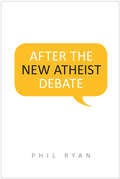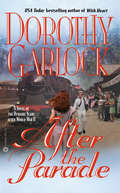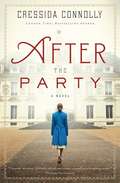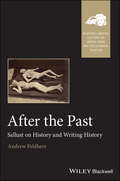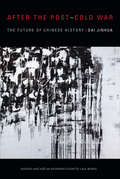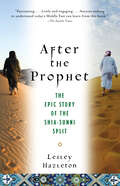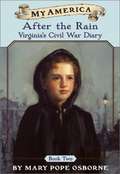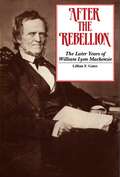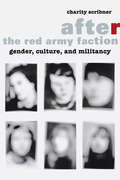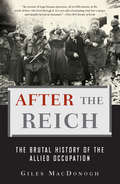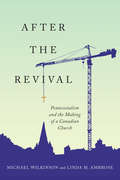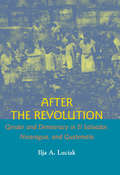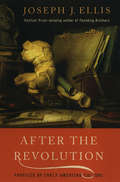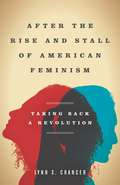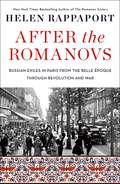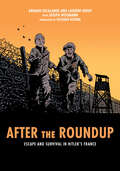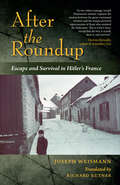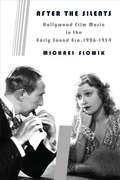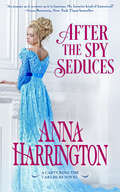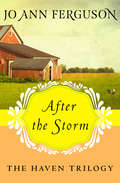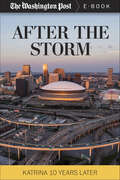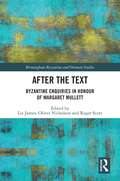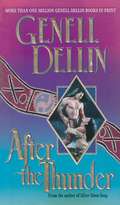- Table View
- List View
After the New Atheist Debate
by Phil RyanThe first decade of the twenty-first century saw a number of best-selling books which not only challenged the existence of god, but claimed that religious faith was dangerous and immoral. The New Atheists, as writers such as Richard Dawkins, Christopher Hitchens, Sam Harris, and Daniel Dennett have become known, sparked a vicious debate over religion's place in modern society.In After the New Atheist Debate, Phil Ryan offers both an elegant summary of this controversy and a path out of the cul-de-sac that this argument has become. Drawing on the social sciences, philosophy, and theology, Ryan examines the claims of the New Atheists and of their various religious and secular opponents and finds both sides wanting.Rather than the mutual demonization that marks the New Atheist debate, Ryan argues that modern society needs respectful ethical dialogue in which citizens present their points of view and seek to understand the positions of others. Lucidly written and clearly argued, After the New Atheist Debate is a book that brings welcome clarity and a solid path to the often contentious conversation about religion in the public sphere.
After the Parade
by Dorothy GarlockDOROTHY GARLOCK...is a New York Times extended list bestselling author, "a gifted writer" (Chicago Sun-Times) who celebrates the indomitable American spirit and the triumphs of the caring heart. Now she vividly portrays the era after World War II, when men and women torn apart by years of combat had to rebuild marriages and lives...Rawlings, Oklahoma, 1945. Johnny Henry is coming home from the Pacific, and his estranged wife, Kathleen, secretly watches him step off the train to a hero's welcome. Her heart races when she sees him; his breaks when he doesn't spot her. Misunderstanding and tragedy had destroyed their marriage right before he shipped out. Now Johnny's pride will keep him from confessing how wrong he had been; now Kathleen's hurt will stop her from running into his arms. But when a disturbed stalker plunges Kathleen into a real-life nightmare, her only hope is Johnny -- and a love that can bring two hearts through every battle, especially the one within.
After the Party
by Cressida ConnollyA captivating novel of manners that tells the story of a dark and disturbing period of British history, by a master storyteller.It is the summer of 1938 and Phyllis Forrester has returned to England after years abroad. Moving into her sister&’s grand country house, she soon finds herself entangled in a new world of idealistic beliefs and seemingly innocent friendships. Fevered talk of another war infiltrates their small, privileged circle, giving way to a thrilling solution: the appointment of a great and charismatic new leader who will restore England to its former glory. At a party hosted by her new friends, Phyllis lets down her guard for a single moment, with devastating consequences. Years later, Phyllis, alone and embittered, recounts the dramatic events which led to her imprisonment and changed the course of her life forever. Powerful, poignant, and exquisitely observed, After the Party is an illuminating portrait of a dark period of British history which has yet to be fully acknowledged.
After the Past: Sallust on History and Writing History (Blackwell-Bristol Lectures on Greece, Rome and the Classical Tradition)
by Andrew FeldherrProvides a unique and accessible understanding of Sallust and his influence on writing the history of Rome Gaius Sallustius Crispus (‘Sallust’, 86-35 BCE) is the earliest Roman historian from whom any works survive. His two extant writings chronicle crucial moments of a political, social, and ethical revolution with profound consequences for his own life and those of his audience. After the Past: Sallust on History and Writing History examines what it meant to write the history of contentious events—Catiline’s famous rebellion in 63 BCE and the war waged against the North African king Jugurtha fifty years earlier—while their effects were still so vividly felt. One of the first book-length treatments of Sallust in over fifty years, the text offers a comprehensive reading of Sallust’s works using the tools of narratology and intertextual analysis to reveal the changing functions of historiography at the end of the Roman Republic. Author Andrew Feldherr’s comprehensive approach examines the literary strategies used by Sallust and many of the most interesting and significant aspects of the historian’s accomplishment while advancing the study of historiography as a literary form, reconsidering its relationship to rival genres such as rhetoric and tragedy. Pursuing a focused and distinctive scholarly argument, this book: Provides a comprehensive approach to Sallust’s extant works Explores how Sallust helped his readers to reflect on their own relationship with their tumultuous past Contributes to understanding Roman conceptualizations of space and of writing Challenges the core assumption that literary historiography of the time period is essentially rhetorical nature After the Past: Sallust on History and Writing History is an accessible and useful resource for students of Latin literature and Roman history from the advanced undergraduate through professional levels, and for all those with an interest in historiography as a literary genre in Greco-Roman antiquity and in the literary history of the late Republic and triumviral period.
After the Post–Cold War: The Future of Chinese History (Sinotheory)
by Lisa Rofel Jinhua DaiIn After the Post–Cold War eminent Chinese cultural critic Dai Jinhua interrogates history, memory, and the future of China as a global economic power in relation to its socialist past, profoundly shaped by the Cold War. Drawing on Marxism, post-structuralism, psychoanalysis, and feminist theory, Dai examines recent Chinese films that erase the country’s socialist history to show how such erasure resignifies socialism’s past as failure and thus forecloses the imagining of a future beyond that of globalized capitalism. She outlines the tension between China’s embrace of the free market and a regime dependent on a socialist imprimatur. She also offers a genealogy of China’s transformation from a source of revolutionary power into a fountainhead of globalized modernity. This narrative, Dai contends, leaves little hope of moving from the capitalist degradation of the present into a radical future that might offer a more socially just world.
After the Prophet: The Epic Story of the Shia-Sunni Split in Islam
by Lesley HazletonIn this gripping narrative history, Lesley Hazleton tells the tragic story at the heart of the ongoing rivalry between the Sunni and Shia branches of Islam, a rift that dominates the news now more than ever. Even as Muhammad lay dying, the battle over who would take control of the new Islamic nation had begun, beginning a succession crisis marked by power grabs, assassination, political intrigue, and passionate faith. Soon Islam was embroiled in civil war, pitting its founder's controversial wife Aisha against his son-in-law Ali, and shattering Muhammad&’s ideal of unity. Combining meticulous research with compelling storytelling, After the Prophet explores the volatile intersection of religion and politics, psychology and culture, and history and current events. It is an indispensable guide to the depth and power of the Shia–Sunni split.
After the Rain: Virginia's Civil War Diary Book 2 (My America Series)
by Mary Pope OsborneIn the final months of the Civil War, Virginia and her family move to Washington, D.C. where the cold winter brings uncertainty and hardship. Virginia takes a job as a servant in a wealthy home to help her family. But, just as things start to improve as her father gets a job, and the war finally comes to an end, the tragic assassination of Ginny's beloved President Lincoln occurs. In this, her second diary chronicling the Civil War, Ginny learns that life is constantly changing. Indeed, even as Lincoln dies, her nephew is born. Throughout, Ginny faces life with hope and courage.
After the Rebellion: The Later Years of William Lyon Mackenzie
by Lilian F. GatesThis comprehensive book on William Lyon Mackenzie’s later life focuses first on the period 1838-1849, Mackenzie’s years in exile in the United States. It examines his contribution to the American political scene, including his role in writing the constitution of the State of New York. The book also chronicles Mackenzie’s life from 1849, when he was granted amnesty and returned to Canada, to his death in 1861. In this, the only comprehensive look at Mackenzie’s life, Lillian Gates offers a meticulous account of one of Canada’s liveliest nineteenth century politicians.
After the Red Army Faction
by Charity ScribnerAnalyzing the afterimage of revolutionary violence in contemporary culture and politics. Utopia or Auschwitz: Germany's 1968 Generation and the Holocaust
After the Red Army Faction: Gender, Culture, and Militancy
by Charity ScribnerMasterminded by women, the Red Army Faction (RAF) terrorized West Germany from the 1970s to the 1990s. Afterimages of its leaders persist in the works of pivotal artists and writers, including Gerhard Richter, Elfriede Jelinek, and Slavoj i ek. Why were women so prominent in the RAF? What does the continuing cultural response to the German armed struggle tell us about the representation of violence, power, and gender today? Engaging critical theory, Charity Scribner addresses these questions and analyzes signal works that point beyond militancy and terrorism. This literature and art discloses the failures of the Far Left and registers the radical potential that RAF women actually forfeited.After the Red Army Faction maps out a cultural history of militancy and introduces "postmilitancy" as a new critical term. <P><P>As Scribner demonstrates, the most compelling examples of postmilitant culture don't just repudiate militancy: these works investigate its horizons of possibility, particularly on the front of sexual politics. Objects of analysis include as-yet untranslated essays by Theodor Adorno and Jürgen Habermas, as well as novels by Friedrich Dürrenmatt and Judith Kuckart, Johann Kresnik's Tanztheaterstück Ulrike Meinhof, and the blockbuster exhibition Regarding Terror at the Berlin Kunst-Werke. Scribner focuses on German cinema, offering incisive interpretations of films by Margarethe von Trotta, Volker Schlöndorff, and Fatih Akin, as well as the international box-office success The Baader-Meinhof Complex. These readings disclose dynamic junctures among several fields of inquiry: national and sexual identity, the disciplining of the militant body, and the relationship between mass media and the arts.
After the Reich: The Brutal History of the Allied Occupation
by Giles MacdonoghWhen Hitler's government collapsed in 1945, Germany was immediately divided up under the control of the Allied Powers and the Soviets. A nation in tatters, in many places literally flattened by bombs, was suddenly subjected to brutal occupation by vengeful victors. According to recent estimates, as many as two million German women were raped by Soviet occupiers. General Eisenhower denied the Germans access to any foreign aid, meaning that German civilians were forced to subsist on about 1,200 calories a day. (American officials privately acknowledged at the time that the death rate amongst adults had risen to four times the pre-war levels; child mortality had increased tenfold). With the authorization of President Franklin Delano Roosevelt, over four million Germans were impressed into forced labor. General George S. Patton was so disgusted by American policy in post-war Germany that he commented in his diary, "It is amusing to recall that we fought the revolution in defense of the rights of man and the civil war to abolish slavery and have now gone back on both principles" Although an astonishing 2. 5 million ordinary Germans were killed in the post-Reich era, few know of this traumatic history. There has been an unspoken understanding amongst historians that the Germans effectively got what they deserved as perpetrators of the Holocaust. First ashamed of their national humiliation at the hands of the Allies and Soviets, and later ashamed of the horrors of the Holocaust, Germans too have remained largely silent - a silence W. G. Sebald movingly described in his controversial book On the Natural History of Destruction. In After the Reich, Giles MacDonogh has written a comprehensive history of Germany and Austria in the postwar period, drawing on a vast array of contemporary first-person accounts of the period. In doing so, he has finally given a voice the millions of who, lucky to survive the war, found themselves struggling to survive a hellish "peace. " A startling account of a massive and brutal military occupation, After the Reich is a major work of history of history with obvious relevance today.
After the Revival: Pentecostalism and the Making of a Canadian Church
by Michael Wilkinson and Linda M. AmbroseEarly Pentecostal revivals swept through Canadian communities, big and small, in the early 1900s. Reports abounded of worshippers falling down at the altar, speaking in tongues, having dreams and visions, and experiencing divine healing. Tent meetings inspired curious onlookers to witness these phenomena for themselves. Following these revival meetings, Pentecostals organized, built churches, and expanded across the country, while many churches were beginning to decline. How did these Pentecostal "holy rollers" move from the fringe to take centre stage in Canada's religious landscape? Why is a religious group rooted in the early twentieth century, tied to Methodism and the Holiness movement, still so popular among followers from all walks of life, especially Indigenous peoples and new Canadians? In After the Revival Michael Wilkinson and Linda Ambrose ask these and other questions, arguing that the answers are tied to Pentecostalism's continued organizational efforts. Since 1919, the Pentecostal Assemblies of Canada (PAOC) has worked to establish order and steady growth by managing financial and material assets, offering programs designed to attract families and youth, and training leaders. While Pentecostalism sometimes reflects broader cultural trends and at other times resists them, the PAOC has grown steadily to become one of the largest evangelical denominations in Canada. Addressing broader questions about how religious movements organize, establish an identity, and develop a subculture that flourishes, After the Revival explores the fascinating history of Pentecostalism in Canada and the ways the church, represented by the PAOC, engages with Canadian society.
After the Revolution: Gender and Democracy in El Salvador, Nicaragua, and Guatemala
by Ilja A. LuciakHow women active in guerilla movements become active in politics after the war. Complements Bayard de Volo's Mothers, Heroes, Martyrs:Gender Identity Politics in Nicaragua, 1979–1999."Gender equality and meaningful democratization are inextricably linked," writes Ilja Luciak. "The democratization of Central America requires the full incorporation of women as voters, candidates, and office holders." In After the Revolution: Gender and Democracy in El Salvador, Nicaragua, and Guatemala, Luciak shows how former guerrilla women in three Central American countries made the transition from insurgents to mainstream political players in the democratization process.Examining the role of women in the various stages of revolutionary and national politics, Luciak begins with women as participants and leaders in guerrilla movements. Women contributed greatly to the revolutionary struggle in all three countries, but thereafter many similarities ended. In Guatemala, ideological disputes reduced women's political effectiveness at both the intra-party and national levels. In Nicaragua, although women's rights became a secondary issue for the revolutionary party, women were nonetheless able to put the issue on the national agenda. In El Salvador, women took leading roles in the revolutionary party and were able to incorporate women's rights into a broad reform agenda. Luciak cautions that while active measures to advance the political role of women have strengthened formal gender equality, only the joint efforts of both sexes can lead to a successful transformation of society based on democratic governance and substantive gender equality.
After the Revolution: Profiles of Early American Culture
by Joseph J. EllisThrough portraits of four figures--Charles Willson Peale, Hugh Henry Brackenridge, William Dunlap, and Noah Webster--Joseph Ellis provides a unique perspective on the role of culture in post-Revolutionary America, both its high expectations and its frustrations. Each life is fascinating in its own right, and each is used to brightly illuminate the historical context.
After the Rise and Stall of American Feminism: Taking Back a Revolution
by Lynn S. ChancerIt is more than fifty years since Betty Friedan diagnosed malaise among suburban housewives and the National Organization of Women was founded. Across the decades, the feminist movement brought about significant progress on workplace discrimination, reproductive rights, and sexual assault. Yet, the proverbial million-dollar question remains: why is there still so much to be done? With this book, Lynn S. Chancer takes stock of the American feminist movement and engages with a new burst of feminist activism. She articulates four common causes—advancing political and economic equality, allowing intimate and sexual freedom, ending violence against women, and expanding the cultural representation of women—considering each in turn to assess what has been gained (or not). It is around these shared concerns, Chancer argues, that we can continue to build a vibrant and expansive feminist movement. After the Rise and Stall of American Feminism takes the long view of the successes and shortcomings of feminism(s). Chancer articulates a broad agenda developed through advancing intersectional concerns about class, race, and sexuality. She advocates ways to reduce the divisiveness that too frequently emphasizes points of disagreement over shared aims. And she offers a vision of individual and social life that does not separate the "personal" from the "political." Ultimately, this book is about not only redressing problems, but also reasserting a future for feminism and its enduring ability to change the world.
After the Romanovs: Russian Exiles in Paris from the Belle Époque Through Revolution and War
by Helen RappaportFrom Helen Rappaport, the New York Times bestselling author of The Romanov Sisters comes After the Romanovs, the story of the Russian aristocrats, artists, and intellectuals who sought freedom and refuge in the City of Light.Paris has always been a city of cultural excellence, fine wine and food, and the latest fashions. But it has also been a place of refuge for those fleeing persecution, never more so than before and after the Russian Revolution and the fall of the Romanov dynasty. For years, Russian aristocrats had enjoyed all that Belle Époque Paris had to offer, spending lavishly when they visited. It was a place of artistic experimentation, such as Diaghilev’s Ballets Russes. But the brutality of the Bolshevik takeover forced Russians of all types to flee their homeland, sometimes leaving with only the clothes on their backs.Arriving in Paris, former princes could be seen driving taxicabs, while their wives who could sew worked for the fashion houses, their unique Russian style serving as inspiration for designers like Coco Chanel. Talented intellectuals, artists, poets, philosophers, and writers struggled in exile, eking out a living at menial jobs. Some, like Bunin, Chagall and Stravinsky, encountered great success in the same Paris that welcomed Americans like Fitzgerald and Hemingway. Political activists sought to overthrow the Bolshevik regime from afar, while double agents from both sides plotted espionage and assassination. Others became trapped in a cycle of poverty and their all-consuming homesickness for Russia, the homeland they had been forced to abandon. This is their story.
After the Roundup: Escape and Survival in Hitler's France
by Joseph WeismannOn the nights of July 16 and 17, 1942, French police rounded up 11-year-old Joseph Weismann, his family, and 13,000 other Jews. They were held for five days at the Vélodrome d'Hiver stadium, before being sent by cattle car to the Beaune-la-Rolande transit camp. But where would they be transported to? Separated from his parents, who were deported to Auschwitz and certain death, Joseph remained with 1,000 other separated children, as they waited to discover their fates.But instead of waiting, Joseph and his new friend, Joe Kogan, chose to risk everything in a daring escape attempt. After eluding the guards and crawling under razor-sharp barbed wire, Joseph found freedom. But how would he survive the rest of the war in Nazi-occupied France and build a life for himself? His nightmare had just begun.After the Roundup is a story of hope, friendship, and courage in the face repression, hatred, and fear. This graphic novel, originally published in French, is based on Weismann's memoir of the same name.
After the Roundup: Escape and Survival in Hitler's France
by Joseph WeismannA Jewish man recounts his experience as a little boy in Paris during World War II and the Holocaust, as well as his escape and survival in this memoir.On the nights of July 16 and 17, 1942, French police rounded up eleven-year-old Joseph Weismann, his family, and 13,000 other Jews. After being held for five days in appalling conditions in the Vélodrome d’Hiver stadium, Joseph and his family were transported by cattle car to the Beaune-la-Rolande internment camp and brutally separated: all the adults and most of the children were transported on to Auschwitz and certain death, but 1,000 children were left behind to wait for a later train. The French guards told the children left behind that they would soon be reunited with their parents, but Joseph and his new friend, Joe Kogan, chose to risk everything in a daring escape attempt. After eluding the guards and crawling under razor-sharp barbed wire, Joseph found freedom. But how would he survive the rest of the war in Nazi-occupied France and build a life for himself? His problems had just begun.Until he was 80, Joseph Weismann kept his story to himself, giving only the slightest hints of it to his wife and three children. Simone Veil, lawyer, politician, President of the European Parliament, and member of the Constitutional Council of France—herself a survivor of Auschwitz—urged him to tell his story. In the original French version of this book and in Roselyne Bosch’s 2010 film La Rafle, Joseph shares his compelling and terrifying story of the Roundup of the Vél’ d’Hiv and his escape. Now, for the first time in English, Joseph tells the rest of his dramatic story in After the Roundup.“As few others manage, Joseph Weismann’s memoir captures the tension between the great communal torment and the unique personal repercussions of those who endured the Holocaust. This is a boy’s story, except that boy is in hell, faces it, and survives.” —Thomas Keneally, author of Schindler’s List“Extraordinary . . . and timely. Joseph Weismann’s compelling account of his escape from an internment camp after the notorious Winter Velodrome roundup of Parisian Jews in July 1942 is both a vivid recreation of childhood (he was 11 years old when he spent a tenacious six hours crawling through a barbed wire fence to make his getaway) and a powerful insight into what it is like to be on the receiving end of the demonization of a race or religion.” —Peter Grose, author of A Good Place to Hide
After the Silents
by Michael SlowikViewing more than two hundred films from the period, Michael Slowik launches the first comprehensive study of a long-neglected phase in Hollywood's initial development
After the Silents: Hollywood Film Music in the Early Sound Era, 1926-1934 (Film and Culture Series)
by Michael SlowikMany believe Max Steiner's score for King Kong (1933) was the first important attempt at integrating background music into sound film, but a closer look at the industry's early sound era (1926–1934) reveals a more extended and fascinating story. Viewing more than two hundred films from the period, Michael Slowik launches the first comprehensive study of a long-neglected phase in Hollywood's initial development, recasting the history of film sound and its relationship to the "Golden Age" of film music (1935–1950). <P><P>Slowik follows filmmakers' shifting combinations of sound and image, recapturing the volatility of this era and the variety of film music strategies that were tested, abandoned, and kept. He explores early film music experiments and accompaniment practices in opera, melodrama, musicals, radio, and silent films and discusses the impact of the advent of synchronized dialogue. He concludes with a reassessment of King Kong and its groundbreaking approach to film music, challenging the film's place and importance in the timeline of sound achievement.
After the Spy Seduces (Capturing the Carlisles #6)
by Anna HarringtonThe Spy Who Loves HerAs the second son of the Earl of Spalding, Christopher Carlisle appears content to do nothing more than live out his life in gambling hells, wild parties, and widows’ beds. But Kit’s scapegrace existence hides his true calling—as a secret operative who has dedicated his life to crown and country. When his partner is murdered, nothing will distract him from his pursuit of justice…until he meets Diana Morgan. When he discovers the general’s lovely daughter disguised as a boy in a seedy tavern, he’s thrust into a tangled web of lies and deceit that leaves him wondering if anything is as it seems. Especially Diana.Diana Morgan will do anything to keep her family safe, including risking her own life. So when her missing brother is accused of treason and murder, she’s forced to make a deal with the devil himself—cooperate with Kit in order to find her brother before the French get to him first. Diana must race to prove her brother’s innocence before Kit can send him to the gallows, but as trust grows between them, so does desire. Soon, secrets are revealed that threaten everything Diana holds most dear, and when their lives are placed in peril, she finds herself desperately wanting the one thing she can never have…Kit’s heart."Consider me a freshly minted fan of Harrington’s style of happy ever after." — USA Today
After the Storm (The Haven Trilogy #3)
by Jo Ann FergusonA young woman&’s search for her family takes her to Haven, Indiana—and into the home of a beguiling stranger with secrets of his own in the final passionate volume of Jo Ann Ferguson&’s heartwarming Haven Trilogy Haven, Indiana, is a long way from Samuel Jennings&’s painful past. And after rescuing three children from the orphan train carrying them west, he finally has the family he always wanted. Then one storm-tossed night, a stranger appears at his door. For the past year, Cailin Rafferty has been searching for her children. Her desperate quest has taken her far from the potato farms of her native Ireland, where she gave her heart only to be cruelly betrayed. Now she has found her son and daughters at last—in the home of a man who loves them like they&’re his own. A man who&’s starting to awaken powerful yearnings in Cailin. But Samuel is harboring secrets that could tear them apart. Are they ready to trust each other with the future and become a real family?After the Storm is the 3rd book in the Haven Trilogy, but you may enjoy reading the series in any order.
After the Storm: Katrina 10 Years Later
by The Washington PostThe aftermath was almost as devastating as the storm itself. In the ten years since Hurricane Katrina hit the Gulf Coast, New Orleans has changed drastically, and The Washington Post returns to the region to take the full measure of the city’s long, troubled, inspiring, unfinished comeback. When Hurricane Katrina hit the Gulf Coast on Aug. 29, 2005, it wrenched more than a million people from their homes and forever altered New Orleans—one of the country’s cultural capitals. It reordered the city’s economy and population in ways that are still being felt today. What changed? And what was lost in the intervening decade? Dozens of Washington Post writers and photographers descended on New Orleans when Katrina hit, and many of those same journalists went back for the anniversary. What they found was a thriving city, buttressed by a new $14.5 billion complex of sea walls, levees, pump stations and outfall canals. What they heard was that, while some mourn the loss of the New Orleans’ soul and authenticity, others—who saw a desperate need for improvement even before the storm—welcome the rebuilding of New Orleans into America’s latest tech hub. This insightful, elegiac eBook, then, is both a backward and forward look at New Orleans’ comeback, full of the voices of those who were pushed by Katrina’s winds in directions they never imagined. “The city, on balance, is far better off than before Katrina,” says Jason Berry, a prolific New Orleans author. “But it’s still a break-your-heart kind of town.”
After the Text: Byzantine Enquiries in Honour of Margaret Mullett (Birmingham Byzantine and Ottoman Studies #32)
by Liz JamesAfter the Text honours the work of renowned historian Margaret Mullett, who since the 1970s has transformed the study of Byzantine literature. Her work has been influential in demonstrating the strength and variety of Byzantine texts. Byzantium is renowned for its achievements in architecture and the visual arts. Professor Mullett's perceptive studies, produced over more than 40 years, have shown that the literature of the Byzantine Empire is of equal beauty and interest, ranging, as it does, from high-style poetry and rhetoric in the classical manner through letters to demotic writings such as fables and the lives of saints. The collection of essays in this volume draws further attention to the wealth and diversity of Byzantine texts, by exploring the Greek literature of Late Antiquity and the Middle Ages in all its variety. These studies, by going, like Professor Mullett herself, beyond the texts, illustrate the value of Byzantine literature for interpreting Byzantine history and civilisation in all its richness. This book is crucial reading for scholars and students of the Byzantine world, as well as for those interested in literary studies.
After the Thunder
by Genell DellinCotannah Chisk-Ko is ordered by her brother to return to the Nation to learn to behave like a proper young woman, but she continues her outrageous flirting and is attacked. Rescued by quiet, spiritual, Walks-With-Spirits, she finds an inner serenity with this man, and when he is unjustly accused of murder, she devotes herself to proving him innocent. Despite their differences, the two are irresistibly drawn to one another, and discover they are truly soulmates.
